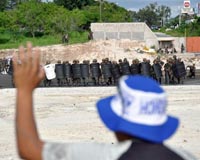| . |  |
. |
Tegucigalpa (AFP) July 20, 2009 There were fears civil war was brewing Monday in Honduras after weekend talks between the country's rival governments collapsed over ousted President Manuel Zelaya's demand he be returned to power. "We have started organizing internal resistance for my return to the country," Zelaya told reporters in Nicaragua, where he has been based since his forced exile on June 28 by the Honduran army. Costa Rican President Oscar Arias warned Honduras was at the brink of "civil war and bloodshed" following the failure of talks he was mediating between representatives of Zelaya and of the new, de facto government in Honduras. Zelaya's negotiators ended those discussions late Sunday after the de facto government's team rejected as "unacceptable" a proposal by Arias that Zelaya go back as president at the head of a "reconciliation" government. Arias, a 1987 Nobel Peace Prize winner for his work in resolving conflicts in Central America, pleaded for the talks to resume after a 72-hour break. There was no indication that appeal was heeded, though sources close to the negotiations said both sides might meet again late Wednesday. Neither Zelaya nor the head of the de facto government, congress leader Roberto Micheletti, were in Costa Rica for the talks. Each man has declared himself the only legitimate president of Honduras. Honduras's new regime took exception to Arias's use of the words "civil war," with its deputy foreign minister, Martha Lorena Alvarado, accusing the Costa Rican president of "taking us towards a situation of near-panic" by using those words. She welcomed the call for 72 hours' reflection, but ruled out allowing Zelaya's return as president, citing Honduras's laws. Micheletti's government has promised to arrest Zelaya if he does reappear in Honduras and prosecute him for treason and 17 other charges. Zelaya's supporters in Honduras, however, said they would intensify their daily protests and road blocks pressing for the ousted leader's reinstatement and hold a strike Thursday and Friday. The leader of the National Front Against the Coup d'Etat, Berta Caceres, told AFP her group opposed Arias's plan for a reconciliation government that included what she termed "the putschists." The secretary general of the Organization of American States, Jose Miguel Insulza, also said his body was going to pressure Honduras's de facto regime to make it recognize "this is a coup that failed." The OAS would hold a meeting Monday to analyze the situation, Insulza said. Zelaya has vowed to reenter Honduras with or without agreement from the rival regime. He tried to fly back into Honduras on July 5 on a plane borrowed from his strongest ally, Venezuelan President Hugo Chavez, but had to abort the landing when Honduran military vehicles parked on the runway. Rumors suggested he might next try to cross the border from Nicaragua. Many of Honduras's lawmakers, judges and military leaders believe Zelaya triggered the crisis by organizing a June 28 referendum, without congressional approval, on whether to change the constitution. They fear the wealthy rancher, who swerved sharply left after being elected to office in 2005, was aiming to lift the one-term limit on Honduran presidents to prolong his mandate. Such a move has been adopted by several leftwing leaders in Latin America, all following Chavez's suit. President Evo Morales of Bolivia and Rafael Correa this year changed rules to enable them to stay in power. Nicaraguan President Daniel Ortega chose Sunday -- the 30th anniversary of his leftist Sandinista revolution -- to declare he, too, would seek to change his country's constitution to seek reelection. The United States has been watching developments in Honduras with concern. "We're looking for a peaceful resolution... These players at the table have it in their power to come to that and we're hoping that they'll do everything they can to reach that resolution," US State Department spokesman Rob McInturff said late Sunday. "In the end this has got to be a solution from Hondurans for Honduras," he said. Share This Article With Planet Earth
Related Links Democracy in the 21st century at TerraDaily.com
 Honduras's ousted government says crisis talks off
Honduras's ousted government says crisis talks offSan Jose (AFP) July 19, 2009 Officials representing ousted President Manuel Zelaya of Honduras said Sunday mediated talks with the country's de facto government had collapsed. The end of the talks in the Costa Rican capital came after the delegation for the de facto government rejected a mediated plan calling for Zelaya's return. The head of Zelaya's delegation in San Jose, Rixi Moncada, announced the end of the ... read more |
|
| The content herein, unless otherwise known to be public domain, are Copyright 1995-2009 - SpaceDaily. AFP and UPI Wire Stories are copyright Agence France-Presse and United Press International. ESA Portal Reports are copyright European Space Agency. All NASA sourced material is public domain. Additional copyrights may apply in whole or part to other bona fide parties. Advertising does not imply endorsement,agreement or approval of any opinions, statements or information provided by SpaceDaily on any Web page published or hosted by SpaceDaily. Privacy Statement |